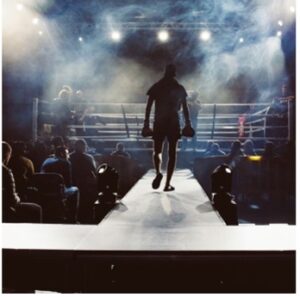 It’s often said, “If you want to get good at something, teach it.” I can’t disagree with that statement, but it does raise a question: Exactly where, and how, do you teach it so you can get good at something?
It’s often said, “If you want to get good at something, teach it.” I can’t disagree with that statement, but it does raise a question: Exactly where, and how, do you teach it so you can get good at something?
I’ve always been a bit jealous of comedians because they can answer that question in a heartbeat: Open mic nights. On these particular evenings, anyone can wander into a dark club, on a dead night, and practice their material. I should know, because unbeknownst to anyone but my wife and son, I grabbed that open mic… twice. It wasn’t pretty, but it didn’t have to be. No one was getting paid, and the “audience” of ten to twelve had low expectations and consisted primarily of other comics and a few unlucky souls. I was far from perfect, but there were no real consequences. What’s more, I learned more in eight minutes in front of that audience than I could have in a lifetime talking to a mirror.
For presenters, it just isn’t that easy. There are no open mic nights, and when you do present, it has to be pretty. You are getting paid, and you have an audience that has high expectations, and there are real consequences. So, the question remains; how do you get better at presenting under these circumstances?
Conventional wisdom will tell you to go to a mirror and deliver your presentation, but if you truly believe that this exercise will properly prepare for a live audience, I’ve got a plot of land I’d like to sell you. You see, mirrors don’t ask questions. Mirrors don’t talk back. Most importantly, mirrors don’t provide the energy and reaction an audience provides. The fact is this: Presenting to a mirror or an empty room is a complete waste of time. What you need is something boxers refer to as “ringwork.”
A boxer can shadowbox, dance around in a ring, hit a heavy bag, and workout all they want, but nothing takes the place of an actual opponent. So, boxers put on their headgear and gloves, and practice with sparring partners. It’s a necessary and critical part of their training.
When you present information, you need to prepare in a similar fashion. You replace that headgear and gloves with your equipment – things like a remote, laptop, PowerPoint, flipcharts, and more. Most importantly, you replace that mirror with a real audience, and that’s where it can get a little tricky. Because of the potential consequences of your performance, you need to find the right audience. In a sense, you’re looking for an audience that is more like a sparring partner. Here are a handful of sparring partners you might consider:
- Rotatory Clubs. Rotary clubs consist of people who wish to create lasting change in the world, in their communities, and in themselves. They are amazing organizations, that they do wonderful things for others… and they are always looking for speakers. You won’t get paid, but you’ll do a great thing for your community, and you’ll get some ringwork in.
- Retirement Communities. These communities are also looking for speakers, and some will pay a small stipend. Another great thing to do for others while you are getting some valuable ringwork in.
- Public libraries. Public libraries truly are hidden gems in many communities. They serve as more than just sources of books; they’re vibrant centers of learning and community engagement… and many of them have an ongoing calendar of events. Once again, you won’t be paid, but you’ll get some ringwork in.
- Meetup Groups. Meetup events are fantastic for networking and honing your conversational skills. What’s more, Meetup events often feature guest speakers and that means ringwork!
You’ll notice, I didn’t list Toastmasters. I’m a big fan of Toastmasters, particularly for those just learning to present, but when you’re looking for real ringwork, you need more than five or ten minutes in front of an audience.
Ringwork isn’t limited to just presenters either. Podcasts, interviews, and almost anything that needs to be performed as cleanly and effortlessly as possible, requires practice. Save the critical podcasts, interviews, and client meetings for later on in the calendar, and do the smaller events first.
No audience is looking for perfection, but what they are looking for is simplicity. That means they want information that’s easy to understand, and they want that material delivered in a confident and succinct manner. You don’t get that from a mirror; you get that from ringwork. Oh, and one final thing: When you do perform your ringwork, you perform that ringwork as if you are getting paid, and this is a critical audience. That will ensure you that these opportunities will truly allow you to practice and improve.
 What do you get when combine energy, enthusiasm… and great content? You get a “Pocket Sized Pep Talk,” and there are now over 275 of them! Tune in and you’ll hear a collection of conversations, interviews, and even some BLArticles® that are sure to teach, motivate, inspire, and oh yes; entertain! https://podcasts.apple.com/us/podcast/pocket-sized-pep-talks/id1497772972
What do you get when combine energy, enthusiasm… and great content? You get a “Pocket Sized Pep Talk,” and there are now over 275 of them! Tune in and you’ll hear a collection of conversations, interviews, and even some BLArticles® that are sure to teach, motivate, inspire, and oh yes; entertain! https://podcasts.apple.com/us/podcast/pocket-sized-pep-talks/id1497772972

Excellent post Rob!
There’s nothing more valuable than a real audience when we are trying new material for presentations. When I talk with someone that will be presenting, I encourage them to present in front of a few friends as a ‘live’ test. Some have said, “No, I will just read it to myself a few times and it will be fine on stage.” I strongly encourage them to talk it out in front of others.
Practice does not make perfect. Perfect practice makes perfect.
Good day brother!
Neil
Friends are a whole lot better than a mirror… as long as they are coached on how to behave as an audience. Those who prefer mirrors will learn the hard way. Good day to you brother!
This is a great analogy for how to get better at speaking and presenting. Love the concept of doing it front of real people. #GetInTheRing
#getinthering – love it! I’ll be getting some ringwork in before my presentation to your organization later this year! Thanks for posting Fred.
Just like Tyson said, “everyone has a plan until they get punched in the face.” As a presenter also I agree there is nothing better than experience. The rooms are different, the lighting is always different, the AV set up, and of course the audience. Gotta be nimble.
Presenting is in the Jolles DNA, and it’s nice to see my nephew here getting up and doing his thing! Get that ringwork in, bring that energy and enthusiasm, and you just can’t lose. Thanks for posting Peter.
Yet another Jolles gem!
Thanks so much. This particular BLArticle® wrote itself because I’ve been yapping about getting ringwork in to those I coach for years. Thanks for posting Beth!
The funny thing about a real audience is, they don’t care how much you are, or are not being paid. They just want content and delivery that connects with them!